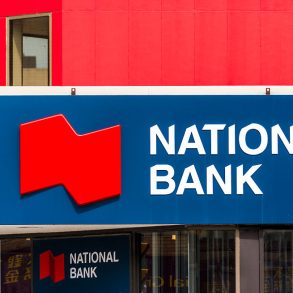Profits were down among the big banks in what has been called a “bleak” fourth-quarter earnings season.
It was the weakest earnings growth since 2016, particularly for the likes of TD and CIBC, who saw their net income fall 3% and 6%, respectively, compared to last year.
TD President and CEO Bharat Masrani called the quarter “challenging” and one “marked by lower interest rates, volatile markets and normalizing credit conditions from historically low levels.”
Several of the banks increased provisions for credit losses in the quarter, as delinquency rates have been on the rise.
As we do every quarter, we’ve picked through the Big Banks’ quarterly earnings reports, presentations and conference calls, and compiled all the mortgage notables right here. Key tidbits are highlighted in blue.
QUICK LINKS:
*********
 Bank of Montreal
Bank of Montreal
Q4 net income: $1.19 billion (-30% Y/Y)
Earnings per share: $1.78
- BMO’s residential mortgage portfolio rose to $112.5 billion, up from $108 billion a year earlier.
- The HELOC portfolio—59% of which is amortizing—rose to $33.8 billion from $31.7 billion a year ago.
- Mortgage growth through proprietary channels, including amortizing HELOCs, was up 5% year-over-year.
- 42% of BMO’s residential mortgage portfolio is insured, down from 54% a year ago.
- The loan-to-value on the uninsured portfolio is 55%, up from 54% in Q4 2018.
- 72% of the portfolio has an effective remaining amortization of 25 years or less, up from 68% a year ago.
- The 90-day delinquency rate rose to 21 bps, up from 19 bps in Q4 2018.
- Net interest margin (NIM) in the quarter was 2.69%, up from 2.65% in Q3 and 2.62% a year ago.
Source: BMO Q4 Investor Presentation
Conference Call
- “Looking ahead to the next year, based on the current economic forecast and our outlook for loan balance growth, we expect to continue the loss rates of recent quarters with a total PCL rate in the low to mid-20s (bps) subject to some quarterly variability,” said Pat Cronin, Chief Risk Officer.
Source: BMO Conference Call
CIBC
Q4 net income: $1.19 billion (-6% Y/Y)
Earnings per share: $2.84
- CIBC’s residential mortgage portfolio remained flat at $202 billion in Q4, unchanged from Q4 2018.
- Of the portfolio, $27 billion is from the Greater Vancouver Area (down from $28 billion a year earlier), and $63 billion is from the Greater Toronto Area (unchanged from a year ago).
- Of the uninsured portfolio, the LTV was 64%, unchanged from a year ago.
- The bank reported $10 billion in originations in the quarter, up from $7 billion a year ago.
- The bank’s HELOC portfolio ended the quarter at $21.2 billion, down from $21.6 billion in Q3 and $22.1 billion a year ago.
- Net interest margin in Q3 was 253 bps, up from 245 bps in Q4 2018.
- Of the bank’s uninsured residential mortgage portfolio, 0.28% are in arrears by 90+ days, up from 0.27% in Q3 and 0.24% in Q4 2018.
- About 7% of the bank’s uninsured portfolio has a Beacon score of 650 or less (unchanged from last year).
Source: CIBC Q4 Investor Presentation
Conference Call
- “Looking forward, we will continue to lead with advice to help our clients achieve their ambitions,” said Victor Dodig, President and CEO. “We’ll add mortgage advisors to help clients achieve their ambitions. We’ll have mortgage advisers to support more conversations with clients about homeownership.”
- On rising 90-day delinquencies, Laura Dottori-Attanasio, Senior EVP and Chief Risk Officer, said this: “The increase is mainly in insured mortgages and secured lines of credit within personal lending that have conservative collateral coverage. As such, we do not expect them to translate into notable losses. Increases are primarily from the Alberta region, which is experiencing more challenging economic conditions and higher unemployment rates.”
- Dodig added, “all of those loans are really well collateralized so losses would be very low if they ever materialize. But if you look at our net write-offs where we’re seeing the bulk of the increases, it is really in our unsecured lines of credit and that would be in line with the broader trend that we’re seeing in Canada where we’ve seen (that) consumer insolvency is up.”
- On the mortgage growth outlook for 2020, Christina Kramer, Senior EVP and Group Head, Personal and Small Business Banking, said, “While we have some more work to do to get back to market level growth, we’re pleased with what we’re seeing and what we’re delivering in the market so we expect improvement in our performance… We see continued strong retention rates and our pipeline remains improved on a year-over-year basis.”
Source: CIBC Conference Call
National Bank of Canada
Q4 net income: $604 million (6.7% Y/Y)
Earnings per share: $1.67 a share
- The bank’s residential mortgage and HELOC portfolio rose to $70.4 billion in Q4, up 4% from $67.6 billion a year ago.
- The bank’s residential mortgage portfolio is 39% insured, down from 42% a year ago.
- The average LTV on the uninsured mortgage portfolio was 60%, while the average LTV on the HELOC portfolio was 58%.
- Quebec represented 55% of the mortgage book (up from 54% from a year ago), while Ontario made up 26% (unchanged) and Alberta 8% (unchanged).
- Net interest margin was 2.23% in Q4, down from 2.25% a year earlier.
- Uninsured mortgages and HELOCs in the GTA and GTV represented 10% (up from 9% in Q4 2018) and 2% (unchanged) of the portfolio, respectively, and have an average LTV of 52% (unchanged from a year ago) and 53% (up from 47%), respectively.
- 21.3% of the bank’s residential mortgage portfolio has a remaining amortization of 25–30 years (down from 23.8% in Q4 2018). Another 26% have a remaining amortization of 0–20 years.
- Of the bank’s uninsured residential mortgage portfolio, 0.19% are in arrears by 90+ days.
Source: National Bank Q4 Investor Presentation
Conference Call
- “Our overweight Quebec and underweight unsecured consumer lending continue to position us well for strong performance in the current economic context,” said William Bonnell, EVP, Risk Management.
- On NBC’s mortgage growth, Lucie Blanchet, EVP, Personal Banking & Client Experience, said, “…we grew our portfolio by remaining disciplined on pricing… And by the way, this appetite didn’t change much irrespective of the real estate market. So, we try to stay consistent on that front.”
- On NBC’s decision to remain disciplined and hold mortgage growth below that of its peers, Blanchet said this: “We have made a conscious decision in favour of…increasing net interest income instead of volume. So, this is definitely in our approach in our management principle and in our discipline.”
- Addressing concerns about rising insolvencies in Canada, Bonnell said this: “…the data for insolvencies are going up, but you see the performance across the country and delinquencies for our mortgages not going up. So, it really seems to be impacting the unsecured credit versus the secured credit…. And in the insolvencies in Quebec, the dollar amount is typically lower than in the rest of the country because Quebec consumers typically are less embedded as well as there’s more propositions than bankruptcies.”
Source: NBC Conference Call
Royal Bank of Canada
Q4 net income: $3.21 billion (-1% Y/Y)
Earnings per share: $2.18
- RBC’s residential mortgage portfolio rose this quarter to $263 billion from $243 billion a year ago.
- Mortgage volume was up 7% year-over-year, “driven by strong double-digit mortgage origination volume growth and strong retention results,” said President and CEO David McKay.
- The bank’s HELOC portfolio fell to $38.8 billion from $40.1 billion a year ago.
- 65% of its mortgages are uninsured, up from 61% a year ago. The average LTV on the uninsured portion is 51%, up from 50% a year ago.
- 90+ day delinquencies in the overall residential mortgage portfolio remained unchanged at 0.19%. For the uninsured portion, delinquencies were steady at 0.16%.
- The bank’s uninsured mortgage portfolio has an average FICO score of 797, up from 793 in Q4 2018.
- The average remaining amortization of RBC’s residential mortgages is 18 years.
- Condo exposure to 10.5% of the bank’s residential lending portfolio, up from 10% in Q4 2018.
- Net interest margin was 2.76%, down from 2.77% in Q4 2018. “Looking forward to 2020, we expect NIM to drop approximately 4 to 6 basis points for the year. Given current competitive mortgage pricing,” McKay said.
Source: RBC Q4 Investor Presentation
Conference Call
- On the bank’s mortgage team growth, President and CEO David McKay said, “We added over 200 investment advisors and mortgage specialists in Canadian Banking over the last year. Part of our strategy is more than just adding capacity, it’s also about having the right talent and capabilities to deliver differentiated advice products and experiences across our channels.”
- On RBC’s Move Snap digital concierge to help clients move from home to home, McKay said: “Client feedback has been very positive and our mortgage specialists thought this is an important addition to RBC’s existing competitive advantage. We plan to scale this venture nationally in 2020. Amply our new loyalty program, which launched in July of this year already has active participation from over 40 leading brands. And we are seeing good early signs of client engagement, we’re excited about the possibilities and will be scaling up this venture as well in 2020.”
- Commenting on the bank’s mortgage growth and whether that might be cause for concern in terms of a re-acceleration in the space, Neil McLaughlin, Group Head Personal and Commercial Banking, replied: “No, definitely nothing concerning, we would look at the strong mortgage performance in 2019 direct was directly as a result of a review, we did around some internal processes and just making sure that we were following up on better lead management, following up on leads more quickly.”
- Doug McGregor, Chairman Capital Markets, also commented on the bank’s above-market mortgage growth, saying, “Our strategy is not obviously to lead the market down in terms of price. I think we’re leading with advice and we’re leading with distribution.”
- On the bank’s outlook, McGregor said, “we’re competing primarily on creating value for our customers and boost that came into that fray. We have another 5 or 6 ventures in the mortgage space that’s creating value that we’re ready to scale nationally.”
Source: RBC Conference Call
Scotiabank
Q4 net income: $2.31 billion (1.8% Y/Y)
Earnings per share: $1.73
- The total portfolio of residential retail mortgages rose to $227 billion in Q4, up from $213 billion in Q4 2018.
- The portfolio is comprised of $195 billion in freehold properties (up from $185 billion a year ago) and $32 billion in condos (up from $28 billion a year ago).
- Residential mortgages grew 5% year-over-year.
- 61% of the residential mortgage portfolio was uninsured in Q4, up from 57% in Q4 2018.
- The average LTV of the uninsured portfolio was 55%, up from 54% in Q4 2018.
- Net interest margin rose to 2.47%, up from 2.45% in Q4 2018, “driven by the impact of prior rate increases,” the bank said.
- 90+ day delinquencies in the residential mortgage portfolio remained stable at 0.20% compared to a year ago.
- The average FICO score is 788 nationwide, and 790 in the GTA and 794 in the GVA.
Source: Scotiabank Q4 Investor Presentation
Conference Call
- Raj Viswanathan, Executive Vice President and Chief Financial Officer, said: “Mortgage rates are being negotiated pretty heavily around the marketplace in Canada. That’s the primary driver of the margin compression, although our deposit margin actually contributed to improving this margin. As we look forward to 2020, I think that’s the best guidance that we can provide at this time…excluding rate changes that might happen at the Bank of Canada, which we do expect in 2020.”
Source: Scotiabank Conference Call
TD Bank
Q4 net income: $2.86 billion (-3% Y/Y)
Earnings per share: $1.54
- TD’s residential mortgage portfolio was $200 billion in Q4, up from $194.1 billion in Q4 2018.
- The bank’s HELOC portfolio rose to $91 billion from $86.3 billion a year ago.
- TD’s residential real estate secured lending portfolio is 69% uninsured (up from 65% a year ago) with a 54% LTV for the uninsured portion (up from 52% in Q4 2018).
- Gross impaired loans in the residential mortgage portfolio were unchanged year-over-year at 0.14%.
- Net interest margin in the bank’s retail portfolio rose to 2.96% in Q4, up from 2.94% a year ago.
- 62% of the bank’s HELOC portfolio is amortizing
- 51% of the bank’s residential mortgage portfolio is in Ontario, followed by the B.C. at 19%, the Prairies at 18%, Quebec at 9% and just 3% in Atlantic Canada.
- Gross impaired loans in the Canadian retail segment rose to 25 bps, up from 22 bps a year ago.
Source: TD Bank Q4 Investor Presentation
Conference Call
- President and CEO Bharat Masrani characterized the quarter as “challenging” and one “marked by lower interest rates, volatile markets and normalizing credit conditions from historically low levels.”
- “…with declining rates and heightened macro concerns pointing to a more subdued outlook for industry revenue growth, we took some restructuring charges this quarter,” Masrani added. “We are accelerating ongoing efforts to modernize our operations and improve our efficiency.”
Source: TD Conference Call
Note: Transcripts are provided by a third party (Seeking Alpha) and their accuracy cannot be 100% assured.








